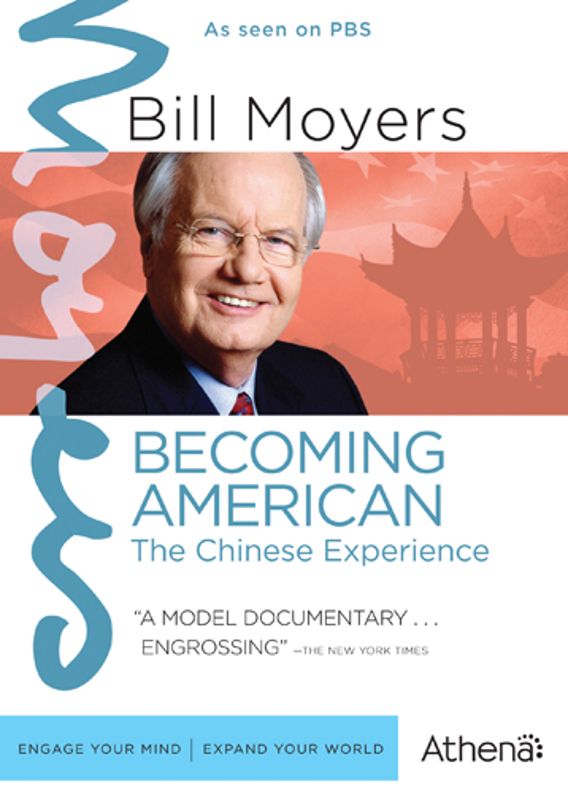
Now available on DVD from the good people at Athena, Bill Moyers: Becoming American is an engrossing three-part documentary about the Chinese American experience. The series debuted on PBS in March of 2003 and was nominated for four Emmys.
The Chinese American experience is one of divergence and difficulty, an often agonizing antiquity that runs through judicial challenges, endemic racism, social hopes, and individual discoveries.
The first episode of Becoming American, “Gold Mountain Dreams,” runs about 80 minutes and details early experiences of Chinese arriving in what would become the United States of America. To the Chinese in Guangdong province, the assurance of gold was intoxicating.
For those arriving in California, their experiences were akin to Pilgrims landing at Cape Cod. The gold mines in California were not part of the United States and the land was anarchic. The first Chinese were welcome, but that changed with the passage of time and the keenness of the “outsiders” to mine gold from claims whites had abandoned. By the 1850s, the first anti-Chinese laws were passed.
“Gold Mountain Dreams” outlines the building of the Transcontinental Railroad, revealing that almost one in five Chinese in America worked on it. They went on strike for equal pay and treatment, but companies cut their food supply and forced the Chinese back to work at the barrel of a gun.
Talk of the “yellow peril” took hold and many blamed Chinese workers for “stealing jobs,” an exhortation that sounds familiar even today. By 1882, the Chinese Exclusion Act was passed without much fight – marking the first time that the United States effectively banned any group based on race or culture.
The second episode continues with the fallout from the Chinese Exclusion Act and consequent exorcising of many Chinese from America, including incidents in Tacoma and the Snake River Massacre. “Between Two Worlds” reveals the refuge of San Francisco and the contrasts many Chinese went through at the time, from being excluded from civic life to working as merchants and restaurant owners.
By 1892, the Chinese Exclusion Act expired and was renewed easily. This round brought identification papers designed for Chinese people only. The Chinese wisely turned to the courts to fight prejudices, using the 14th Amendment in the Constitution as the basis for any “person” using the legal system.
Meanwhile, Chinese women fought tyranny in their own communities. They fought against the confines of patriarchal society. In the 1880s, roughly half of the Chinese women living in the United States were prostitutes taken from their homeland by gangsters. Becoming American details a fascinating story of a Protestant woman rescuing Chinese women from brothels and turning them into Mission Girls.
The Chinese Exclusion Act continued to be renewed every 10 years and each incarnation was much tougher. Key political leaders suggested that Americans had a responsibility to the planet to be “pure” and “the trustees for mankind.” By 1902, Congress expanded the Exclusion Act to Hawaii and the Philippines.
“Between Two Worlds” reveals the fortitude of the 1906 San Francisco earthquake and the subsequent fire in Chinatown. This may not seem lucky at the outset, but Moyers’ documentary reveals that the fire also took out immigration records. The floodgates had opened and many Chinese used the opportunity to enter America and bring family members to the new Promised Land.
The third episode, “No Turning Back,” picks up after the tide against the Chinese changed. The bombing of Pearl Harbor in 1941 found Americans struggling through communities of Asians to split the Japanese from Chinese, determining that China’s own history against their new enemies gave them something in common after all.
By October of 1965, the new “non-revolutionary” Immigration Act had passed and migration became an issue of ability, skill and family – not of race. The Chinese were no longer excluded.
The third episode switches things from a broader historical view to a smaller individual level, zeroing in on specific Chinese Americans to outline their stories and experiences. Moyers talks to people who experienced the Communist scares under Joe McCarthy. He talks to banjo player Charlie Chin and Yahoo! founder Jerry Yang, detailing the Chinese American experience as it continues to evolve.
As you can tell, the experience of Chinese Americans has been a difficult and often perplexing one. The people of China went from heroes to villains and back again in the eyes of many American people and this often tumultuous history continues to this day, playing out in small towns and big cities across the country.
Moyers’ documentary is comprehensive and absorbing from start to finish and there is almost too much information to process as the journalist runs through the personal stories and broad histories of Chinese Americans.
The DVD set also includes a bonus program, Becoming American: Personal Journeys with Bill Moyers, that discusses stories with notable Chinese Americans. There’s a 16-page viewer’s guide as well.